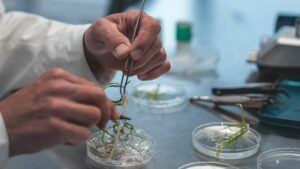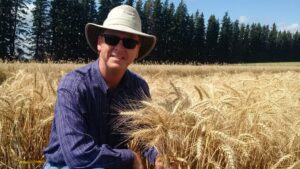People News
During the Canadian Seed Trade Association’s 91st Annual Meeting, members elected Dave Baute, owner and president of Maizex Seeds in Tilbury, Ont., to serve as the 2014-15 president. CSTA delegates elected its 2014-15 board of directors and also honoured retiring board members, Stephen Denys of Pride Seeds and Dave Harwood of DuPont Pioneer. Todd Hyra of SeCan was re-elected for a second term. New directors include Ellen Sparry of C&M Seeds and Wayne Gale of Stokes Seeds.
Arysta LifeScience North America added two members to its Canadian sales team, Justin Daymond as technical sales manager and Katie Speir as territory sales manager. Daymond will provide agronomic support to retailers and growers in the Yorkton/western Manitoba region, while Speir will work with customers in west central Saskatchewan.
Alliance Seed Corporation, a Prairies-based cereal seed company, appointed Chris Churko as general manager. Prior to joining Alliance Seed, Churko spent the past several years at Viterra Inc., where he was product manager of cereals and bulk seed. Churko will be responsible for executing the strategic plan while growing the company’s sales.
Syngenta appointed Ponsi Trivisvavet as a region director for North America and president of Syngenta Seeds Inc. She replaces David Morgan who was recently named global head of vegetables for Syngenta and is based in Basel, Switzerland. Trivisvavet, based in Minnetonka, Minn., will share responsibility for the Syngenta North American business with Vern Hawkins, region director, North America. Previously, Trivisvavet was head of Syngenta’s Southeast Asia territory, where she led agricultural business operations in Indonesia, Malaysia, Philippines, Thailand and Vietnam.
Neal Gutterson joined DuPont Pioneer as vice-president of agricultural biotechnology. Previously the president and CEO of Mendel Biotechnology, Gutterson has more than 30 years of experience in plant biotechnology and is a named inventor on more than three dozen patents and patent-pending applications.
Product News
Canterra Seeds has launched its new AC Emerson winter wheat. Certified seed of the new variety will be available for the first time this fall. Developed by Rob Graf of Agriculture and Agri-Food Canada, it’s the first wheat variety to receive the resistant rating to fusarium head blight (FHB). “The R rating to FHB is a huge achievement in plant breeding,” says Brent Derkatch, Canterra Seeds director of operations and business development. Canterra Seeds holds the exclusive marketing rights for the variety.
FP Genetics has partnered with Paterson Grain in a demonstration program for Brasetto hybrid fall rye, which was recently registered. FP Genetics’ breeding partner, German-based KWS, has provided FP Genetics with the first viable cereal hybrid registered in Canada. “This exceptional hybrid demonstrates 20 to 25 per cent higher yield than the check variety, and has winter hardiness that is better than other fall cereals such as winter wheat,” says Rod Merryweather, CEO of FP Genetics. The new partnership will see several hybrid rye fields planted this fall.
Business News
Syngenta and Anheuser-Busch InBev (AB InBev) partner to source high-quality malting barley — the key raw material for the beer industry. Under the agreement, growers will have access to the best Syngenta malting barley varieties and a tailored growing approach, which includes training and advice on agronomy and sustainable farming practices. By following the protocol, growers will achieve superior yields when compared with current market standards, enabling them to supply AB InBev with consistently high-quality grain to meet the exacting standards for beer production. “We wish to keep barley relevant and interesting for growers by helping them develop their business in a qualitative, sustainable and profitable way,” says Tony Milikin, chief procurement officer of AB InBev. “As we work with more than 15,000 growers through long-standing barley programs in the United States, Canada, Mexico, Brazil, Uruguay, Argentina, China and Russia, we look forward to turning this new project into a shared success that we can scale.”
FP Genetics and Decisive Farming will promote their new combination service to farms that want significant improvements in yields and profitability. Decisive Farming’s variable-rate seed (Optimize RX-S) uses patent-pending technology to enhance profits through improved placement of seed, which optimizes the potential of each area within the customer’s fields. “We are so sure we will deliver greater returns, we will pay the cost of Optimize RX-S for all growers who use the service along with our leading varieties,” says Rod Merryweather, CEO of FP Genetics.
The Canadian government announced an investment of up to $535,000 to Prairie Tide Chemicals Inc., which aims to improve the value of flax. Prairie Tide Chemicals Inc. will partner with Bioriginal and the University of Saskatchewan to develop methods for commercial-scale recovery of sweet flax oil and flax orbitides, which will be studied and tested to determine how they can be used commercially in food and cosmetic products.
Monsanto has entered into a single-season, non-exclusive agency agreement with Agrium to offer the use of Monsanto’s Climate Pro platform to Crop Production Services’ grower customers. The Climate Pro technology will complement CPS’s existing comprehensive precision agriculture products and services offering, known as Echelon. Agrium will provide additional details on the growth strategy for Echelon precision agriculture in the second half of 2014.
John Deere and BASF plan to jointly develop integrated precision farming solutions to enhance arable farming productivity. Developed in collaboration with growers, the new tools will combine BASF’s agronomic and crop protection expertise with John Deere’s application and farm data management know-how to provide customers with enhanced agronomic decision support. The first integrated tools are expected to be available in 2015. “As we include customer experience and expertise from around the globe and from different crop production systems into the development of our new solutions, growers should expect high-quality and targeted benefits throughout the entire production cycle, from seeding to harvesting,” says Hans-Jürgen Lutz, vice-president of business development of BASF’s Crop Protection division.
Industry News
The International Wheat Genome Sequencing Consortium (IWGSC) published a draft sequence of the bread wheat genome in the journal Science. The draft sequence provides new insight into the structure, organization and evolution of the world’s most widely-grown cereal crop. The consortium has established the first reference sequence for the largest chromosome, 3B, which could serve as a template for sequencing the remaining chromosomes. “With the draft gene sequence for each of the bread wheat chromosomes and the first reference sequence of chromosome 3B, we have reached a milestone in our roadmap,” says Catherine Feuillet, IWGSC co-chair. “With a chromosome-based full sequence in hand, plant breeders now have high-quality tools to speed up breeding programs and identify how genes control complex traits.”
Research has confirmed the presence of a different clubroot pathotype in the Edmonton, Alta., region that can overcome current forms of clubroot resistance. Earlier this year, Stephen Strelkov at the University of Alberta investigated samples collected from several fields and verified higher levels of infection than expected in some clubroot-resistant varieties. He recently completed his second phase of testing on these pathogen populations. “This is a different pathotype that none of the commercially available clubroot-resistant varieties in Western Canada are effective at managing,” Strelkov says. To better understand the pathogen’s prevalence and distribution, the Edmonton region will be surveyed.
A honeybee health surveillance study will be completed to document the health of Canadian honeybees. The Alberta Beekeepers Commission, representing 60 per cent of Canada’s honey crop, submitted a grant proposal to conduct a Canada-wide honeybee health surveillance study, which has been approved by Agriculture and Agri-Food Canada. The study will build on the surveillance that’s been completed at a regional level and will provide crucial information to continue to look at all the factors affecting honeybee health. Led by Carlos Castillo and his team at the National Bee Diagnostic Centre in Beaverlodge, Alta., the study will be completed over four years.
Restricting the use of neonicotinoids could reduce revenues from corn and soybean production by more than $630 million per year in Ontario and the province’s gross domestic product would be cut by nearly $440 million if neonicotinoids were not available for use, according to a new report from the Conference Board of Canada. The report, Seeds for Success: The Value of Seed Treatments for Ontario Growers, provides a new perspective on the costs of a hypothetical regulatory restriction on existing businesses and operators. “For any significant change in regulations, it’s important for governments to consider the effects on individual farming businesses, as well as the broader costs and benefits,” says Vijay Gill, director of policy research with the Conference Board of Canada.
To improve the marketability of winter wheat, the Alberta Wheat Commission will invest $75,000 during three years to help fund a technical specialist position at the Canadian International Grains Institute in Winnipeg, Man. The position is co-funded by Winter Cereals Manitoba and the Saskatchewan Winter Cereals Development Commission with a total investment of $225,000. This new position will be responsible for market development strategies that promote winter wheat and provide a better return on investment for Canada’s winter wheat growers.
The Canadian federal government and the Manitoba provincial government announced a combined investment of more than $1.8 million to the National Sunflower Association of Canada to develop new seed varieties and boost sunflower acreage in Western Canada. NSAC will receive more than $1.2 million from the federal AgriInnovation Program and $320,000 from the cost-shared Growing Innovation – Agri-Food Research and Development Initiative to support the development of adaptable, disease resistant and herbicide tolerant confection sunflower hybrids that meet the needs of international markets and demands from growers.
The Canadian government announced a $5 million investment to the Canadian International Grains Institute to fund innovative applications for field crops. Through support from Agriculture and Agri-Food Canada’s AgriInnovation Program, the institute will work to ensure industry delivers the highest quality food products and increases its competitive position. The research will focus on creating innovative applications and market-ready products developed from field crops, including wheat and pulses.
The team of Harvard University researchers that created RoboBees are developing these robotic insects with the ability to pollinate crops. The RoboBees, first introduced in 2013, are bee-sized robots that have the ability to hover in mid-air when connected to a power source. At the time, the team found it impossible to add more weight to the tiny body of the robot without sacrificing its ability to fly. Kevin Ma, Harvard graduate student and mechanical engineer, says that the team is “on the eve of the next big development” for RoboBees, as the robots are now able to take on more weight while in flight. The team believes that in 10 years, RoboBees will be ready to carry out artificial pollination on food crops.
Research carried out by seed physiologists from Wageningen UR and seed experts from the Centre for Genetic Resources in the Netherlands showed that when seeds were stored without oxygen, 98 per cent of them germinated after three weeks. In their scientific article, Wageningen researchers propose that gene banks package seeds in oxygen-poor conditions immediately after harvest and drying, which will slow the loss of antioxidants. This means that the seeds can be stored for longer periods of time, reducing regeneration costs. The Centre for Genetic Resources is a Dutch gene bank, which is part of Wageningen UR.
Where on the Web
Clearpoint Advanced, a new web-based farm management tool exclusive to BASF customers, allows growers to manage all their farm data. The new tool gives growers the ability to perform crop budgeting, crop planning, equipment data integration and GIS mapping, as well as manage grain contracts and farm grain inventories. It comes with a complete farm accounting platform, and allows growers to generate reports on their farm data in real time. Clearpoint Advanced will be available to growers this fall.
Encirca Yield services, launched by DuPont Pioneer, is designed to help growers improve timing, placement and management of inputs to enhance the overall productivity and profitability of every acre. “The Encirca Yield services platform provides a new way for our customers to assess their crop’s performance in real time, and make management decisions that will ultimately improve their operation’s bottom line,” says Steve Reno, DuPont Pioneer vice-president, regional business director for U.S. and Canada. The Encirca Yield platform relies on several innovative enabling technologies that mimic crop production throughout the growing season. Pioneer helps growers with this analysis through insights provided by a local Encirca-certified services agent.













